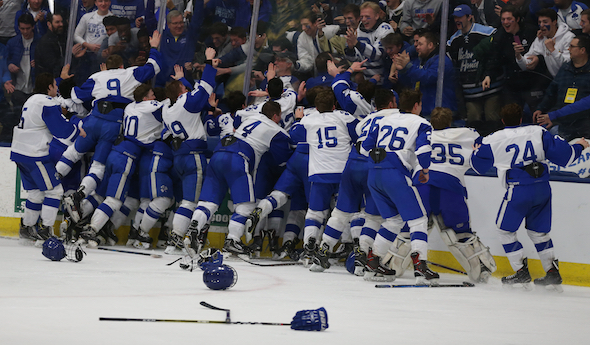
DCC's Championship Dream Comes True
March 9, 2019
Second Half reports
PLYMOUTH — Brendan Hill was hooked on high school hockey long before he played his first shift at Detroit Catholic Central.
“When I was like 8 years old, I would come to these games and watch and see how rowdy the student section is,” said Hill, a senior defenseman. “I had a dream to play at C.C. It just happened. There’s no words for it.”
The dream came with a dream ending for Hill and the Shamrocks’ 12 seniors, as their final act in a Catholic Central uniform was celebrating an MHSAA Division 1 championship after a 3-1 victory over Saginaw Heritage on Saturday at USA Hockey Arena.
The game was played before an enthusiastic crowd of about 3,000 fans, including two large and vocal student sections.
“You have all your closest buddies up there going bananas,” senior forward Carter Korpi said. “It’s awesome. It makes it that much better.”
The atmosphere in which the game was played is the biggest selling point for coaches like Catholic Central’s Brandon Kaleniecki when they try to persuade students in their own hallways to choose the high school game over the travel ranks.
Another selling point is the caliber of play in Michigan. There was a time when Catholic Central would steamroll through the MHSAA Tournament, facing little opposition. Those days are gone.
The Shamrocks, heavy favorites to win it all this winter, had to survive a 1-0 Quarterfinal with Salem and a 4-2 Semifinal with Rochester United and needed an empty-net goal in the final minute before they could exhale against Heritage.
“Obviously, there’s a lot of big programs out there,” Kaleniecki said. “That’s what makes winning so difficult, because you never know. The last three games were all close, tight games that required everything we had to get through it. There is a lot of talent in the state of Michigan. There is a lot of talent in high school hockey.
“If you watched all the games today, the environment speaks for itself and why more and more kids are going to want to play high school hockey. Guys from this team are going on to play juniors. That option is there. People are starting to realize that; hopefully more do, because you get to experience something like this. As a coach, I love it. I’m so excited to be a part of it.”
This senior class was at risk of being one of the few at Catholic Central to not win an MHSAA championship during its time in the program.
It was the 14th MHSAA title for the Shamrocks, tying them with Trenton for second most all-time. Bloomfield Hills Cranbrook Kingswood leads the way with 17 titles. Only three times in the last 22 seasons has Catholic Central gone more than one year without a championship.
The Shamrocks fell short against Brighton each of the last two seasons, losing 5-2 in the 2017 championship game and 2-1 in the 2018 Semifinals.
 “When you have that good of players on the ice and off the ice, when they’d lose it’s tragic,” Catholic Central senior forward Mitch Morris said. “I’m really happy we all got to celebrate. It’s bittersweet. You feel bad for (the last two senior classes). You wish you could have done more. I hope all the underclassmen realize that’s why you play.”
“When you have that good of players on the ice and off the ice, when they’d lose it’s tragic,” Catholic Central senior forward Mitch Morris said. “I’m really happy we all got to celebrate. It’s bittersweet. You feel bad for (the last two senior classes). You wish you could have done more. I hope all the underclassmen realize that’s why you play.”
Catholic Central took a 1-0 lead when senior forward Rylan Clemons skated in from the left circle and put a shot from close quarters under the crossbar over the right shoulder of Heritage goalie Jack Jesko at 9:22 of the first period.
Jesko kept it a one-goal game when he made perhaps the save of the year in high school hockey. Down on his side during a scramble around the net, Jesko made a glove save on a shot by Zach Borchardt, who appeared to have almost the entire net available with 7:29 left in the second period.
“I was just trying to throw my glove out and give myself a chance,” said Jesko, whose 44 saves on 46 shots ranked fifth for an MHSAA Final. “Happy to hit it. I just kept my focus and acted like it was just a normal save; don’t get too high and don’t get too low.”
The Shamrocks finally got some breathing room when Ryan Marra deflected a shot from the point by Luke Collins past Jesko with 10:41 left in the game.
The Hawks pulled Jesko for an extra attacker with 2:12 remaining and quickly cashed in, cutting the deficit to 2-1 on a goal by Edison Symons with 1:56 to go.
Marra scored into an empty net with 54.4 seconds left to seal the Shamrocks’ victory.
For Heritage, it was the second straight loss in the MHSAA championship game against an established power. The Hawks lost to Brighton, 5-2, in last year’s title game. Before last year, the only team from Saginaw to reach a championship game was Saginaw Nouvel, which lost in the 1990 Class B Final.
“We’re really trying to make strides in getting our team noticed throughout the state, and not just in our area,” Heritage coach J.J. Bamberger said. “This is our fifth final four appearance and second state championship game, coming up short both times. For a school like ours in our area, that’s nothing to be ashamed of.”
PHOTOS: (Top) Detroit Catholic Central players celebrate their Division 1 championship with their fans Saturday night at USA Hockey Arena. (Middle) Heritage goalie Jack Jesko stretches to block the net as DCC’s Zach Borchardt winds up for a shot.
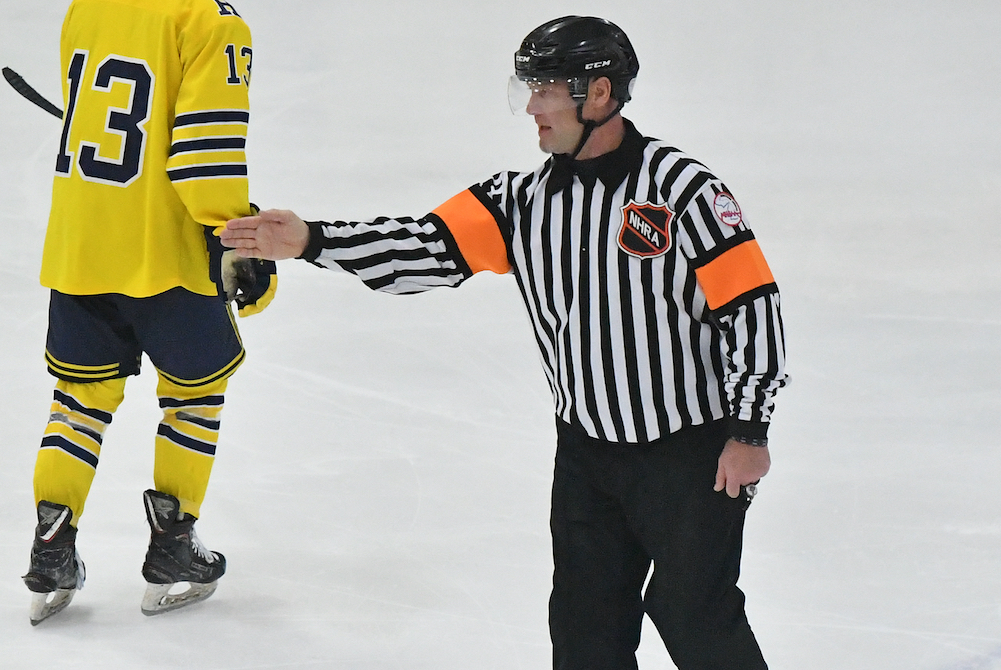
Retired NHL-er Back on Ice to Answer Call - By Making Them
By
Rob Kaminski
MHSAA benchmarks editor
March 16, 2023
The most accomplished skater on the ice during Friday’s triple-overtime MHSAA Division 1 Semifinal hockey thriller between Hartland and Brighton was not wearing the school colors of either team.
In front of a packed house at Plymouth’s USA Hockey Arena, referee Bryan Smolinski was in stripes, just like the rest of his officiating crew.
In his former life, he pulled on plenty of sweaters before lacing up the skates. That happens when one logs more than 1,000 games, tallies nearly 300 goals (274) and close to 400 assists (377) with eight teams spanning a 15-year playing career in the National Hockey League.
So, how did the 52-year-old former star player find himself on the ice last weekend as one of the referees for the pinnacle weekend of this high school season? Good question, even for the man known as “Smoke” during his playing days.
“I was working in youth development programs a few years back and reached out to some Michigan guys I had connections with about other ways to help the game,” Smolinski said. “I called Kevin May just to chat and asked, ‘Hey, how’s your reffing going?’ He said, ‘You know, we’re down a little bit,’ then said, ‘Why don’t you do it?’ I said, ‘Not a chance,’” Smolinski laughed.
Never Say Never
May persisted, imploring his friend to skate with him during a Fall league at Cranbrook in Bloomfield Hills. After eight weeks, once a week, Smolinski had a revelation.
“I’m like, ‘I’m kind of diggin’ this,’” Smolinski said “So, I did all the testing, and the educational part of it, and I really enjoyed it. I got with Danny (DiCristofaro) and his group, and he put me in as much as he could, and I really started to get my feet wet.”
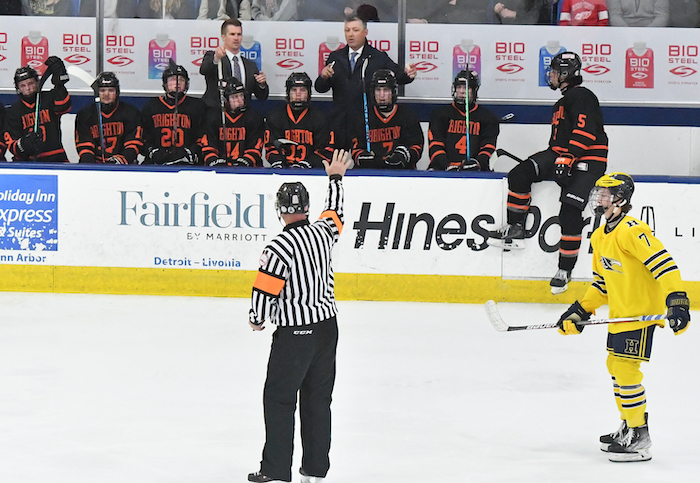 DiCristofaro is the assigner and referee-in-chief for the MHSAA’s Northeast Hockey Referees Association, and he has seen Smolinski’s growth first-hand.
DiCristofaro is the assigner and referee-in-chief for the MHSAA’s Northeast Hockey Referees Association, and he has seen Smolinski’s growth first-hand.
“Obviously he’s got great instincts and a feel for the game, along with a wealth of experience, all of which has allowed him to climb the ladder quickly,” said DiCristofaro. “It’s been a joy to watch his growth as an official.”
Fast forward to last Friday, and there were Smolinski and May sharing duties as referees during the MHSAA Semifinal with linesmen Michael Andrews and Thomas Robbins.
In between, there has been a learning curve that still continues, but the jump to officiating was not quite as daunting as his introduction to the NHL.
“I was scared to death. My first game was against Mario Lemieux. I’m in the old Boston Garden and now I’m playing against these guys and it’s their job, and they’re out there trying to make a living,” Smolinski recalled.
The emotions were not running nearly as frenzied for his first game as an MHSAA official, obviously, yet respect came in a different form.
“I couldn’t pick the puck up, I was breathing heavily; it was Kevin and me doing a two-man game in Brighton,” Smolinski recalled. “There were a few high-end kids playing, and I’m thinking, ‘I’m dying here.’ You know, there’s no training for that first time.”
What that experience did, however, was revitalize Smolinski in a new way. His playing career is well documented, not only in the NHL, but around Michigan. He enjoyed an honor-laden career at Michigan State University from 1989-93 before joining the Boston Bruins (who had drafted him three years earlier) at the end of the ’93 NHL campaign. Even after his final season, with Montreal in 2007-08, he stayed in the game via men’s leagues, or coaching his son, Max.
Smolinski and his wife, Julie, have three daughters: Ashtyn (22), Jojo (16) and Rylen (12), along with Max, whom dad coached for seven years including during a national championship run with a Little Caesars U15 team in 2019. Max, 19, is now playing collegiately at Rensselaer Polytechnic Institute.
So, for Smolinski, officiating offers a new chapter.
“Reffing brought back ... I wouldn’t say love of the game, because that’s always been there; it’s a different side of enjoying the game now. I have no horse in the race, my son’s off to college, my daughters are doing their thing; I wanted to find something new in the game,” Smolinski said. “I’ve coached, and I don’t want to do that. I found this, and I’ve stuck with it.”
Old College Ties
One of the great benefits of athletics at any level are the friendships made. For two kids who met in their first years on the MSU campus and forged a bond that lasts to this day, it’s amazing how their careers reached the pinnacle and have now come full circle.
Wes McCauley, an MSU teammate, is one of Smolinski’s best friends. After numerous years in the minor leagues, McCauley, like his friend, made it to the NHL. But McCauley made it as an official, working his first NHL game in 2003, when Smolinski was nearing the end of his playing career.
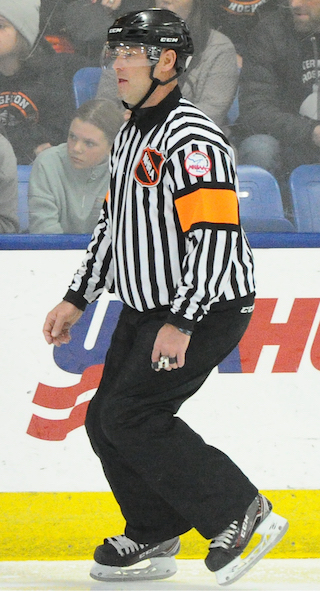 Their games lined up on just a few occasions in the NHL, and the two lobbied hard to have McCauley work Smolinski’s 1,000th career game in his final season with the Canadiens in 2007-08. The request, sadly, was denied by the league.
Their games lined up on just a few occasions in the NHL, and the two lobbied hard to have McCauley work Smolinski’s 1,000th career game in his final season with the Canadiens in 2007-08. The request, sadly, was denied by the league.
On the rare occasions when the friends did share the same ice, less than a handful by Smolinski’s count, it was McCauley who was forced to rebuff any attempts at fraternization. It’s just part of an official’s edict.
“For both of us, it was amazing; it was just great,” Smolinski said. “I’d say, ‘Hey man what’s up?’ and he says, ‘Can’t talk.’ I’m like, ‘What do you mean, we talk all the time.’ Again, he’s like, ‘Can’t talk, get away from me.’ You know, it was just business.”
McCauley then reached the 1,000-game plateau himself in 2018 and is still going strong as a regular selection for playoff duties with nine Stanley Cup Finals assignments, including last year.
So, it should have been natural for Smolinski to go to his old friend immediately for officiating pointers once he joined the ranks, right? Well, maybe not immediately.
“I talk to Wes all the time, but I actually hid it from him right out of the gate because I didn’t want to take his razzing. Eventually it got out, and he was loving it. He started sending me whistles and visors and pants,” Smolinski said, grinning. “And none of it fit, you know, because I’m older and fatter, and he’s so damn skinny. So, I still had to go out and get all new gear.”
Both Sides Now
Having been to the top of his profession, now moving to the other side of that same mountain that his friend McCauley scaled, the respect has grown for those blowing the whistle.
“The preparation for officiating is much more mental,” Smolinski said. “Way more rules oriented. You’re always trying to get away with things that you can as a player; now you have to police that.”
Smolinski has a distinct advantage.
“I know everything they’re trying to do because I’ve done it. I know where you’re going with the puck, I know what kind of breakout you’re trying to do,” Smolinski said. “I have all the instincts, now I just try to stay out of the way and not ruin their game. The most fun is watching the game develop and the ups and downs. For me to be out there and enjoy it with them, that’s the fun part.”
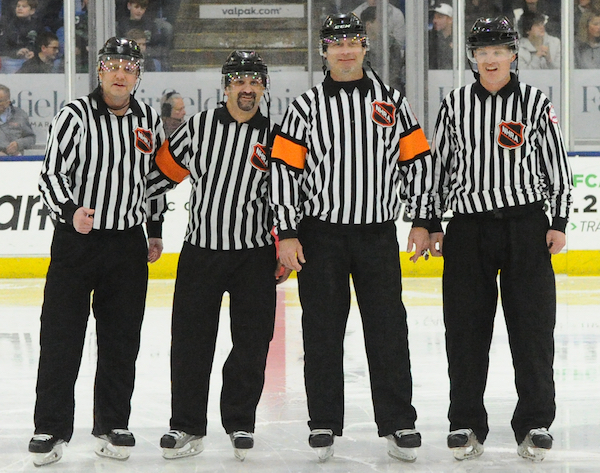 Those who have played hockey at any level have a built-in advantage should they consider the officiating avocation: the ability to skate. Unlike officiating in any other sport, skating is a prerequisite. This makes the pool limited, and almost solely composed of former players. Smolinski offers this advice.
Those who have played hockey at any level have a built-in advantage should they consider the officiating avocation: the ability to skate. Unlike officiating in any other sport, skating is a prerequisite. This makes the pool limited, and almost solely composed of former players. Smolinski offers this advice.
“I prefer sticking with high school because I think there’s more decorum, more administrative structure. Kids are playing for their schools, there’s loyalty there,” said Smolinski. “And there is more accountability. People need report to athletic directors and supervisors. Other levels can be more loosely governed, or a bit more maverick in nature. Moms and dads get involved more, coaches maybe know a little less,” said Smolinski.
He has, in fact, worked a handful of non-school games, and there’s a stark difference.
“I wanted to see what was going on, and I see it first-hand,” Smolinski said. “There are some crazy people and parents out there, and these guys are getting absolutely tortured. I’ve been tortured. There has to be a level of respect for what officials do. I think schools can rein that in a little more. All the guys I’ve met give up a lot of time and work hard because they love to do it and love the game.”
All sports need an assist from school administration and from those who once played the games to keep the officials recruitment moving in the right direction. People like Smolinski can help.
“He clearly doesn’t need to do this, and that’s what makes it so fantastic,” DiCristofaro said. “We need more people who have played – at any level – to do what he’s done and stay in the game as officials.”
Smolinski continues to promote the game in other ways as well. Currently, he is involved in the NHL’s Learn To Play initiative, which aims to inspire youth and welcome more families into the hockey community.
“We work hand-in-hand with the NHL Players Association for player development and industry growth,” Smolinski said. “Ages 5 to 9 are introduced to hockey, get head-to-toe gear and instruction, and meet some former players.”
The idea is to have fun first, which can translate into years and maybe even a lifetime in the sport. It’s a lifetime that has given Smolinski so much and continues to do so as he watches it unfold for others from his new vantage point.
PHOTOS (Top) MHSAA official Bryan Smolinski signals during Friday's Division 1 Semifinal between Brighton and Hartland. (2) Smolinski, a retired NHL standout, communicates with the Bulldogs' bench. (3) Smolinski keeps watch during game play. (4) Smolinski, third from left, with his crew: Michael Andrews, Kevin May and Thomas Robbins.

